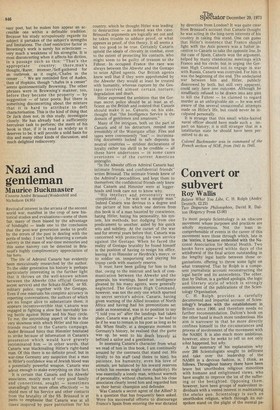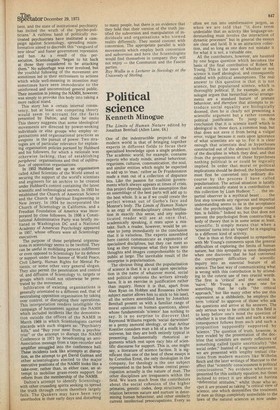Convert or subvert
Roy Wallis
Believe What You Like, C. H. Rolph (Andre Deutsch, £2.25) Two Disparate Philosophies,. David R. Dalton (Regency Press 0.00)
To most people Scientology is an obscure movement whose purposes and practices are wholly mysterious. Not the least incomprehensible of events in the career of this movement were those through which, late in the 'sixties, it became embroiled with the National Association for Mental Health. Two books have appeared within days of the withdrawal of the final action outstanding in the lengthy legal battle between these organisations, offering to throw some light on what transpired. That by Rolph is a competent journalistic account reconstructing the legal battle and its antecedents. The other, that by Dalton, is a garbled apologia, the logic and literary style of which is strongly reminiscent of the publications of the Scientology Organisation.
C. H. Rolph provides a carefully documented and impartial account of Scientology's brushes with the establishment in, Britain since 1966, and therefore needs no further recommendation. Dalton's book on the other hand is much more tendentious. His aim is narrower in that he more directly confines himself to the circumstances and process of involvement of the movement with the NAMH. It is also much more ambitious, however, since he seeks to tell us not only what happened, but why. A fair summary of his explanation why over 200 Scientologists sought to infiltrate and take over the leadership of the NAMH in a devious fashion, is, I think, as follows. Throughout history there have been brave but unorthodox religious minorities with humane and enlightened views, who have sought to improve the lot of the suffering or the benighted. Opposing them, however, have been groups of malevolent individuals with a vested interest in maintaining the status quo. Scientology is such an unorthodox religion, which through its outspoken stand on the plight of the mental pa
tient, and the state of institutional psychiatry has incited the wrath of the 'psycho-poli ticians.' A ruthless band of politically mo tivated psychiatrists have instituted a campaign against Scientology, spreading misin formation aimed to discredit this "vanguard of
new ideas" and foster government repression and ban. As a result of this per
secution, Scientologists "began to hit back at those they considered to be attacking them." No subterfuge was ever involved, but the youthful following of the movement are sometimes led in their enthusiasm to actions which while well-meaning in intention may sometimes have seen immoderate to the uninformed and uncommitted general public. Their intention in joining the NAMH, however, was simply to provoke this body into taking a more radical stand.
This story has a certain internal consistency, but at least one competing theory would seem to account for the facts presented by Dalton, and those he omits This theory suggests that some ideological movements are directed by power-seeking individuals or elite groups who employ organisations and organisational practices as
weapons in the pursuit of power. Two stra
tegies are of particular relevance for explaining organisation policies pursued by Hubbard
and his followers, for which a rationale was otherwise lacking, that of establishing peripheral organisations and that of infiltration of opposition organisations.
In 1952 Hubbard set up an organisation called Allied Scientists of the World aimed at securing the support of the world's scientists and engineers for an archive to be created under Hubbard's control containing the latest
scientific and technological secrets. In 1953 he
established the Church of American Science and the Church of Spiritual Engineering in New Jersey. In 1954 he incorporated the Church of Scientology in California, and a Freudian Foundation of America was incor porated by close followers. In 1956 a Consti tutional Administrative Party was briefly initiated in Washington DC and a National Academy of American Psychology appeared in 1957, whose officers were all Scientology executives.
The purpose of these peripheral organisations in scientology seems to be twofold. They can be useful in mobilising persons indifferent or even opposed to Scientology for its defence or support under the banner of World Peace, Civil Liberty, Human Rights for Mental Pa tients, or some other very general slogan. They also permit the penetration and control of, and diffusion of Scientology to, targets or groups which could not otherwise be penetrated by the movement.
Infiltration of existing organisations is generally orientated to a different end, that of neutralising opposition organisation by taking over control, or disrupting their operations. This interpretation renders intelligible the campaign of harassment against the NAMH which included incidents like the demonstration outside the offices of the NAMH in March 1969 in which Scientologists carried placards with such slogans as: "Psychiatry kills," and "Buy your meat from a psychia trist" or the attempt to disrupt the NAMH Conference in 1971 by broadcasting an antiAssociation message from a tape-recorder and amplifier smuggled into the conference hall. These incidents look like attempts at disruption, as the attempt to get David Gaiman and
other scientologists elected to the major executive positions of the NAMH looks like a take-over, rather than, in either case, an attempt to mobilise grass-roots support for reform from the membership of the NAMB. Dalton's attempt to identify Scientology with other crusading spirits seeking to spread. the truth through reform therefore largely fails. The Quakers may have been very unorthodox in their early days and disturbing to many people, but there is no evidence that they held that their version of the truth justified the subversion and manipulation of individuals and organisations who viewed reality differently. They rested content with conversion. The appropriate parallel is with movements which employ both conversion and subversion and here the Scientologists would find themselves in company they will not enjoy — the Communist and the Fascist parties.
Roy Wallis is a Lecturer in Sociology at the University of Stirling.



























 Previous page
Previous page